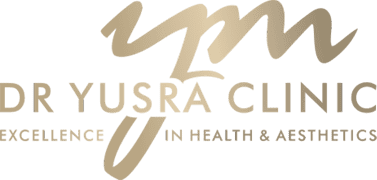What is the Best Filler for Non-Surgical Rhinoplasty?
Posted on 27th May 2024 by Dr Yusra Al-Mukhtar

Non-surgical rhinoplasty is also known as a “liquid nose job,” and has increased in popularity over the past few years.
This minimally invasive procedure offers a convenient alternative to surgical rhinoplasty to allow you to enhance or change the shape of your nose without needing surgery.
The key to achieving your ideal nose through non-surgical rhinoplasty is through dermal fillers. But, with various options available, which is the best type of filler for non-surgical rhinoplasty? Read on to find out.
What is Non-Surgical Rhinoplasty?
Before we jump into what filler is best for a non-surgical nose job, it is important that you understand what non-surgical rhinoplasty is.
Unlike traditional rhinoplasty, which involves incisions and reshaping of the nasal bones and cartilage, non-surgical rhinoplasty uses injectable fillers to change the appearance of your nose.
This method is ideal for smoothing out bumps, lifting the tip, and enhancing the nasal bridge to provide you with immediate results and minimal downtime.
What Are Dermal Fillers?
Dermal fillers are injected beneath the skin to restore lost volume, smooth out lines, and improve facial contours. In non-surgical rhinoplasty, these fillers work by adding volume to specific areas of the nose, therefore, reshaping it.
The type of filler used is essential as it determines how long the filler lasts, safety, and overall appearance.
Different Types of Dermal Fillers
There are many different types of dermal fillers, however, the main fillers used in non-surgical rhinoplasty are hyaluronic acid (HA) fillers and calcium hydroxylapatite (CaHA) fillers. Both have properties that make them suitable for nasal contouring.
Hyaluronic Acid Fillers
Hyaluronic acid (HA) is a naturally occurring substance in the body and is known for its ability to retain moisture and add volume. HA fillers are the most commonly used fillers in non-surgical rhinoplasty because of their safety and effectiveness.
Here are some of the HA fillers used for a non-surgical nose job:
1: Juvederm
Juvederm is one of the most popular hyaluronic acid fillers known for its smooth consistency and long-lasting results.
This type of filler is particularly effective for reshaping the nasal bridge and smoothing out any bumps or lumps.
The results of this filler typically last between 12 to 18 months.
2. Restylane:
Another well-known HA filler is Restylane. This type of filler offers a slightly firmer consistency compared to Juvederm, which makes it ideal for adding definition and structure.
This filler typically lasts around 12 months.
Hyaluronic acid fillers are many people’s first choice because they can be dissolved if the client is unhappy with the results. This is done by an enzyme called hyaluronidase, which can be injected into the nose to dissolve the filler.
Calcium Hydroxylapatite Fillers
Calcium hydroxylapatite is another naturally occurring substance and it can be found in human bones. CaHA fillers, such as Radiesse, offer a denser filler option compared to HA fillers.
Radiesse:
This type of filler is known for its ability to provide immediate volume and stimulate collagen production. Radiesse is highly effective for more substantial nasal corrections.
The results can last up to 18 months.
However, unlike HA fillers, CaHA fillers are not reversed easily, which can put people off if adjustments are needed.
Things to Consider When Choosing Filler
When determining the best filler for non-surgical rhinoplasty, there are some factors that you need to consider, including the desired results, the patient’s anatomy, the cost of the treatment and the practitioner’s expertise.
Safety and Reversibility
Hyaluronic acid fillers are generally considered the safest option thanks to their reversibility, which is why many people choose this type of filler.
If any complications arise, such as overcorrection or vascular occlusion, hyaluronidase can dissolve the filler quickly, mitigating potential risks. This makes HA fillers an excellent choice for you if you’re looking for a less permanent solution.
Longevity and Results
While HA fillers offer reversibility, CaHA fillers like Radiesse provide longer-lasting results. If you are looking for a more durable enhancement, CaHA fillers may be the solution for you.
These fillers also stimulate collagen production, which can improve skin texture and firmness over time.
Natural Look and Feel
Both HA and CaHA fillers can achieve a natural look and feel when administered correctly. HA fillers usually blend into the skin very well and provide a soft and natural appearance.
On the other hand, CaHA fillers offer more structure and can be a better choice if you are after more pronounced reshaping.
The Practitioner’s Skill
Although the type of filler is important, the skill and experience of the practitioner play a key role in the success of non-surgical rhinoplasty.
An experienced practitioner will assess the patient’s nasal anatomy and aesthetic goals to choose the appropriate filler and technique to achieve the best results.
Non-Surgical Rhinoplasty at Dr Yusra
Non-surgical rhinoplasty is a great way to enhance the appearance of your nose without the need for invasive surgery.
While both hyaluronic acid and calcium hydroxylapatite fillers are excellent choices, the best filler for non-surgical rhinoplasty depends on various factors, including safety, longevity, and the desired outcome.
Hyaluronic acid fillers like Juvederm and Restylane provide a versatile and reversible option, which is ideal if you are looking for a less permanent solution or trying non-surgical rhinoplasty for the first time.
On the other hand, calcium hydroxylapatite fillers like Radiesse offer longer-lasting results and are better suited for more significant nasal corrections. By following the nose filler aftercare instructions, your non-surgical rhinoplasty will last longer and heal quicker.
If you are still unsure about which filler is best for you, we can discuss this in your consultation if you decide to go forward.

